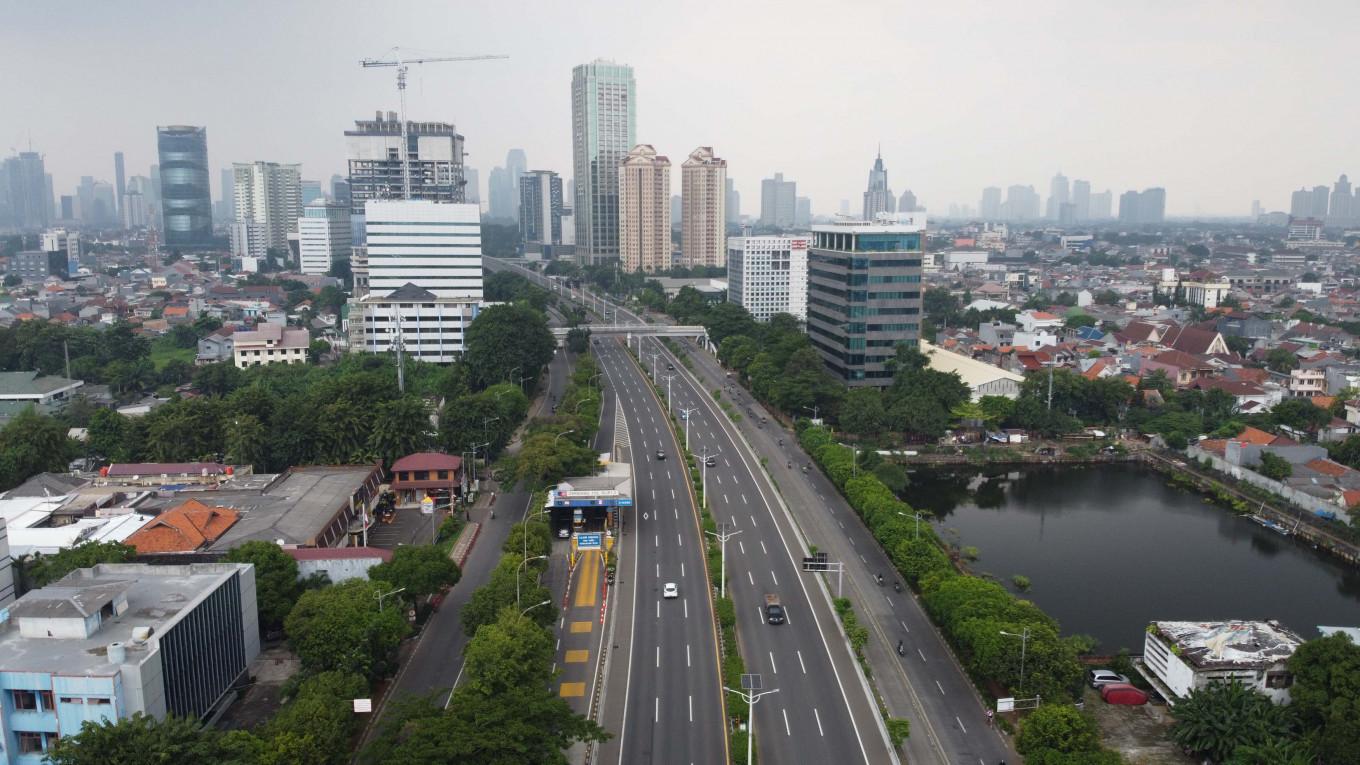Popular Reads
Top Results
Can't find what you're looking for?
View all search resultsPopular Reads
Top Results
Can't find what you're looking for?
View all search resultsIndonesia’s economy heads into turbulence as Q1 growth plunges: Economists
Indonesia's gross domestic product (GDP) grew 2.97 percent year-on-year (yoy) in the first three months of this year as household spending and investment growth slowed.
Change text size
Gift Premium Articles
to Anyone
 Cars drive on the almost empty Slipi-Kemanggisan toll road in Jakarta on April 10. Indonesia's gross domestic product (GDP) grew 2.97 percent year-on-year (yoy) in the first three months of this year as household spending and investment growth slowed amid the coronavirus outbreak. (JP/Donny Fernando)
Cars drive on the almost empty Slipi-Kemanggisan toll road in Jakarta on April 10. Indonesia's gross domestic product (GDP) grew 2.97 percent year-on-year (yoy) in the first three months of this year as household spending and investment growth slowed amid the coronavirus outbreak. (JP/Donny Fernando)
I
ndonesia’s economy is heading into turbulence as the COVID-19 pandemic is expected to further batter growth after the country recorded the weakest economic expansion since 2001 in the first quarter of the year, economists have warned.
The country's gross domestic product (GDP) grew 2.97 percent year-on-year (yoy) in the first three months of the year as household spending and investment growth slowed amid the coronavirus outbreak, Statistics Indonesia (BPS) announced on Tuesday. The growth is weaker than the government’s, the central bank’s and economists’ projections of around 4 percent.
“The sudden stop in economic activity during the first quarter marks the beginning of weak GDP growth caused by the pandemic,” University of Indonesia economist Fithra Faisal told The Jakarta Post on Tuesday. “We are heading into the weakest growth since the 1998-1999 Asian financial crisis.”
He expected the economy to contract 0.8 percent if the pandemic continued into the third quarter, adding that the economy would grow at a range of between 1.2 and 2 percent if the health crisis subsided by June.
“It is crucial to immediately end the virus crisis through containment measures,” Fithra said.
The Jakarta Composite Index (JCI) erased some of its gains on Tuesday after the announcement but closed trading up 0.53 percent to 4,630.13 while the rupiah appreciated by 0.13 percent to Rp 15,080 per US dollar on the day.
Four provinces and 22 regencies/cities nationwide have implemented large scale social restrictions to contain the virus spread, forcing businesses to close and hitting demand as people are required to stay at home. More than 12,000 people have contracted the disease in Indonesia with a death toll reaching at least 870 as of Tuesday afternoon, official data showed.
Household spending, which accounts for more than half of GDP, grew sluggishly by 2.84 percent in the first quarter – far lower than the 5.01 percent recorded over the same period in 2019, while investment, the second-largest contributor, grew 1.7 percent versus the 5.03 percent recorded in January-March last year.
Government expenditure grew by 3.74 percent in the first quarter, lower than the 5.22 percent growth recorded in the same period last year. Exports increased by 0.24 percent while imports contracted by 2.19 percent as Indonesia’s major trading partners, such as China, went into lockdowns.
Fitch Solutions wrote in its research note on April 22 that it expected consumer spending growth to tank to 1.2 percent this year as more Indonesians lose their jobs during the pandemic.
“The second quarter GDP growth is expected to be significantly lower than that of the first quarter as the prolonged pandemic limits people’s travel and activities,” Bank Mandiri economist Andry Asmoro said. “Furthermore, high uncertainty about when the COVID-19 pandemic will completely end could drag down the full-year figure to below 2 percent.”
The government has forecast the country’s economy to expand by 2.3 percent this year in the baseline scenario, or contract by 0.4 percent in the worst-case scenario.
Permata Bank economist Josua Pardede called on the government to expedite its spending on social safety nets, as well as to re-allocate more funds to mitigate the economic devastation caused by the pandemic.
“The economy may grow between zero to 1 percent this year if economic activity does not pick up in the third quarter,” Josua told the Post.
“The government’s budget re-allocation must be improved to focus more on COVID-19 relief in a bid to protect households’ purchasing power,” he said, adding that the zero growth projection would translate into 5 million to 8 million people losing their jobs in the months ahead as the pandemic chokes companies’ cash flows.
Around 2.8 million people had been laid off as of mid-April, according to the Manpower Ministry and the Workers Social Security Agency (BPJS Ketenagakerjaan), with more than half of them on paid or unpaid leave.
The Finance Ministry’s Fiscal Policy Agency (BKF) head, Febrio Nathan Kacaribu, said the government would speed up the distribution of its social assistance in the second quarter, especially the stimulus for micro, small and medium businesses.
“With this kind of cushion, the government is hoping to ease the pressure on households and businesses, particularly small and medium businesses,” Febrio said in a statement to reporters.
The government has allocated funds of Rp 436.1 trillion (US$28.9 billion), mainly for healthcare spending, social safety nets and incentives for laid-off workers, among other things, as it works to soften the pandemic’s impact on the economy.









